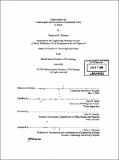Opportunities for technological and economic development policy in Brazil
Author(s)
Dalquist, Stephanie K. (Stephanie Kay), 1981-
DownloadFull printable version (7.817Mb)
Other Contributors
Massachusetts Institute of Technology. Technology and Policy Program.
Advisor
Amy B. Smith.
Terms of use
Metadata
Show full item recordAbstract
Brazil's transformation from an agriculturally-based colonial economy to an industrial republic spans seven decades - from the 1930s to the present - with three rapid growth phases which were each followed by economic and social chaos. Three administrations of different political persuasions implemented policies that brought surges of foreign direct investment, foreign technology, and mechanization to Brazil. The nation's economy grew at an astounding rate - for several years at the highest rate in the world - but increased industrialization only increased the gap between the rich and the poor, and failed to provide the long-term employment and domestic investment required for sustainable advancement. Brazil has a stable economy again, and ready for another period of rapid growth. However, future economic growth for the long-term will be dependent on aiding sectors that have been left behind in previous decades. What is needed is a set of policies that addresses the inequality within regions, poverty in the rural and urban environment, vast income inequality, and sustainable rural development. Combined with renewed investment in domestic innovation, community-based solutions can increase the returns on national investment in development. By working with community partners in low-income areas, appropriate solutions can be introduced to an environment of long-term support. A joint project between MIT, the Universidade de Sio Paulo, and the Escola de Canuani in rural Tocantins, Brazil, serves as an example of how partnerships between local and outside organizations can introduce organizational and technical solutions adapted to local needs and constraints. (cont.) In January 2005, this interdisciplinary team worked in Brazil with community partners to introduce technology at levels as different as evaporative cooling by pottery and a computer center to address the challenges and ambitions of their everyday life. The technology case studies are not to determine success but rather to discover what needs to be in place for their implementation. A similar model of incorporating community input in program design and execution could be used in national development plans with greater effect than previous methods.
Description
Thesis (S.M.)--Massachusetts Institute of Technology, Engineering Systems Division, Technology and Policy Program, 2005. Includes bibliographical references (leaves 166-170).
Date issued
2005Department
Massachusetts Institute of Technology. Engineering Systems Division; Technology and Policy ProgramPublisher
Massachusetts Institute of Technology
Keywords
Technology and Policy Program.